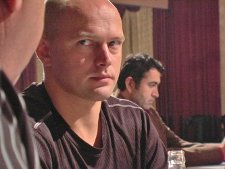
Artem Mishin, who co-stars in Babnik
Alejandro Adams will be hoping three's the charm, when his latest film, Babnik, premieres at San Jose's Cinequest festival later this week. His debut feature Around The Bay premiered there in 2008 and last year, his follow-up Canary did the same.
Chatting to Adams last October, he was in the process of editing Babnik, trying to negotiate distribution for his first two films and putting to bed two films he was shooting simultaneously, Child Of God and Amity. I ask if he finds the combination of working on three films tiring or if he likes to be constantly shooting the next thing. It seems that's certainly out of the question at the moment as he has just sold his camera equipment.
"They were more or less technically obsolete," he says. " I’m cameraless but I can protect my [filmmaking] identity because I’m editing three films simultaneously. There’s almost a relief of pressure, because when the cameras are sitting there you want to go shoot something, so now I’m able to focus on what’s already shot."
Of all the projects, Babnik - with Cinequest in mind - is closest to being finished. "It's is about a Russian sex trafficking ring," he says.
Key to the cast is Michael Umansky - who has featured in both of Adams' previous films, though in smaller roles.
"He has such a fascinating onscreen charisma and I really wanted to tap into it on a bigger scale," says Adams. "So I put him at the head of this ragtag sex trafficking ring. And the ragtag mess of it is exactly what I wanted to get into because I think we tend to envision organised crime – especially international – as just incredibly slick and well run and I wanted to look more at something that was maybe a couple of guys working out of their house and manipulating other people into helping them but not ever pulling guns out and not doing anything particularly shady with money and just somehow making things come together."
The plot may sound reasonably straight forward, but issues of communications have lain at the heart of Adams' previous work - Around The Bay sees communication breakdown on a family level, while Canary takes it into a more society-wide arena. Babnik certainly has some communication themes at its heart, too, if only because it is shot entirely in Russian.

"It was more of a personal challenge to shoot a film in a language I don’t speak and in restaurants and bars and markets that were populated by a culture that was impenetrable to me," admits Adams. "Imagine editing footage where you have no idea, other than a gist, of what’s being said. So you’re not sure where to cut."
He's also a bit concerned that Canary may be the first of the films to get a proper release. He says: "It is a more difficult film than my first and I worry that if that’s the first one to be released then I’ll have a sort of stigma I wouldn’t have had. They’re both difficult films but I think Canary is much more opaque and inaccessible."
It's certainly true that Canary is more open to interpretation than his first film. Around The Bay tells the story of Daisy (Katherine Celio), the estranged daughter of Wyatt (Steve Voldseth), who returns to his home to look after her half-brother Noah. Canary, meanwhile, is set in a near-future - or possibly an alternative present - where organs routinely fail and are replaced by Canary Industries... but woe betide those who don't look after them properly. Despite the difference in genre - straight drama and sci-fi - both deal with communication, or the lack of it.
"They’re more thematically connected people would realise at a glance," he says. "Certainly Around The Bay uses a lot of techniques that separate audio from the visual aspects and I think that results in a really clear non-communication theme, whereas in Canary it’s not done in terms of technique as much, hence you have a character who simply doesn’t speak and there are foreign language sequences that are not subtitled at all.
"So you get this sense of possibly a melting pot gone awry or some sort of society where either everyone speaks everything or people are just totally unable to communicate with one another."
And despite the fact that Around The Bay is adapted from his own story, while Canary span off from an idea by Michael and Sammy Samuelson, he says both projects are very personal.

"Around The Bay was adapted from an unfinished short story of my own that I thought would work cinematically, mainly because the father figure continued to elude me in prose and I just could not figure him out. But I thought I could find an actor who could do this and probably make an excellent film from it. With Canary, if I showed you the short film, you wouldn’t believe that my film was adapted from it.
"Basically, I was thrilled with the ideas conveyed in the short film. It was actually very funny but it was also really grotesque and it had a lot of gravitas. I guess the humour was what you might expect from something like Brazil, but yet in a seven minute film it had more of the gravitas you’d expect from a sophisticated European director. And I thought, ‘Man, how did they do that.’ I marvelled at that for a very long time. They were friends of mine and I tried to convince them to make a feature. They sort of blew me off, so I said, ‘Well can I do it?’ And they said, ‘Sure’.
"So, what I ended up doing was…they had this big, bald-headed, thuggish looking guy playing the role in the film going around reclaiming organs. And I said: 'What if its more a totally neutralised looking female, who doesn’t look as though she could beat anyone up. And who is, in every way, a neutral personality, dealing with the themes in terms of social alienation'. So, in making that decision, I think the themes of the film opened themselves up to be much more personal than I had ever imagined when I suggested adapting it. I was just interested in it, in the sense of how can you marry this gravitas with light comedy. With Canary, I think that some people walk out thinking it was mostly funny and some people walk out thinking it was mostly creepy.
"I am originally a fiction writer and I think I would prefer to work from my own ideas. In the case of Canary, had I just strictly just expanded the original seven-minute version, it would have fallen flat. But I think, as it is, having married some very personal themes of my own social alienation to this essentially dystopian concept, I think it does feel really uncomfortable. But I don’t know how this discomfort plays into the effect of the film."
Thinking about the future - and those tantalising distribution deals - Adams insists: "I’m less interested less in the revenue than in having the availability of one of my films catapult me to the next level somehow, if that makes raising a proper budget and making a larger scale film that would hopefully be the next thing beyond the five we just shot."
We certainly wish him luck.
 |





















